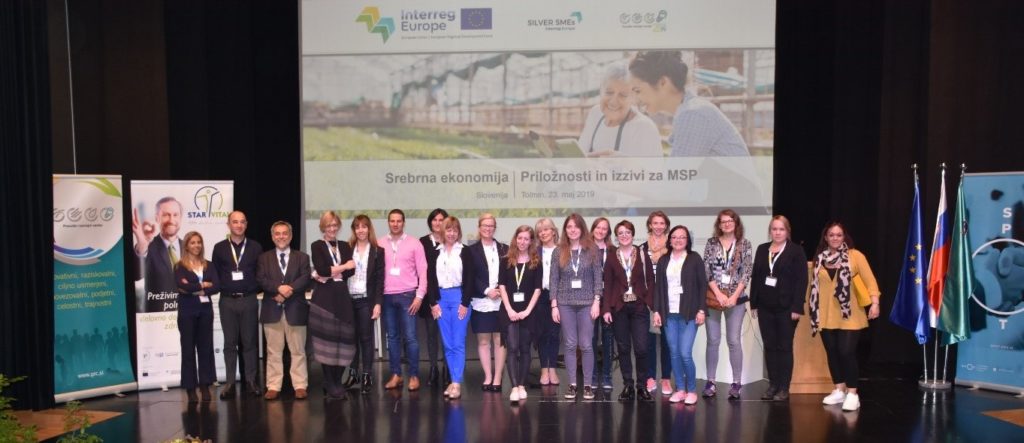On Thursday, 23rd May 2019, was organised an international conference on “Business opportunities linked to Active Ageing” in Tolmin, Slovenia, by the SILVER SMEs project, in which Euromontana is a partner. SILVER SMEs is an Interreg Europe project aiming at boosting rural growth by supporting SMEs of the silver economy, offering goods and services for older adults in rural and mountainous areas. Gathering national and regional policy makers, researchers and silver economy actors, this conference aimed at identifying challenges and opportunities in the Silver Economy sector.

Klemen Širok, project manager at the University of Primorska, Slovenia, kicked off the conference by introducing the audience to the STAR-VITAL project financed by the European Social Fund and the Slovenian Ministry of Labour, Family, Social Affairs and Equal Opportunities. The aim of the project is to develop solutions for companies to adapt to older workers.
The point of view of policy-makers
Marko Vudrag from the Slovenian National Institute of Public Health called for a change of mindset in the public healthcare system. In his opinion, healthcare should not be a business but a public service with a holistic approach. Indeed, data shows a correlation between the ageing of the population and the increasing occurrence of health problems. So not only does the national healthcare system need to tackle medical issues but also healthy lifestyles as a whole, using a multi-sectoral approach, included in the national sustainability strategy. His comments were supported by Klavdija Kobal Straus, from the Long-term Care Directorate within the Slovenian Ministry of Health. Indeed, the concern in Slovenia is that while longevity is improving health is not.
Innovative initiatives across the European Union
Some examples of innovative initiatives and projects were presented during the day:
- DIH.Healthday.si: a digital hub to promote innovative healthcare in the Silver Economy. A grassroots initiative which developed into a yearly programme to support and promote companies with innovative products or services.
- eHealth and eCare with Telekom Slovenije: this initiative is based on two separate concepts: on the one hand, older adults are costly for the healthcare system (every person aged 65+ falls at least once a year which is 100% more expensive than accidents linked to road accidents for instance) and on the other hand, 1 out of 3 person over 75 lives alone in Slovenia. eCare is originally a telemedicine alert system but the operators have been trained to respond also to people who simply feel lonely. The service is partly funded by municipalities.
- ESF project “Turning Silver Tsunami into a Silver Lining”: the aim is to inform SMEs about the Silver Economy and the opportunity it represents, as well as to pilot new services targeting the older adults (business models, public services, etc.). An example is the Pamplemousse 50+ language and culture course proposed a tourism office in Finland for 50+ adults to go and spend a week in Bordeaux to learn French and discover the region.
- Assistive Technology Center, Dalarna, Sweden: The aim of this initiative is to introduce prevention devices into the lives of people who are not in need of care yet to avoid accidents and a sudden health deterioration. The challenge is both to work on older adults’ mentalities so that they accept support and on society’s view of older adults, so they do not neglect them. This initiative uses a show flat, a mobile show room and organises workshops.
The presentation of these innovative practices was the opportunity to discuss policies related to the Silver Economy in other countries than Slovenia. For instance, in Finland, the ageing population is seen as a driver for economic growth as the older adults’ purchasing and spending habits have evolved over the years. The Finnish model is based on the idea that developing public services will trigger older adults’ activeness through social inclusion and thus, their spending power. On the other hand, the regional authority of Noord Brabant, Netherlands, chose to invest in the regional innovation ecosystem to foster collaborations, out of which smart solutions for active ageing could be scaled up. They chose to enable the private sector to develop solutions.
Conclusion
In conclusion, “Business opportunities for active ageing” seem to be interpreted by the policy-makers at the event as opportunities to adapt the working environment to an older workforce, whereas entrepreneurs see the business opportunities in the market represented by older adults. The challenges occurring especially in rural areas are the faster pace of ageing in these regions, as well as the digital divide which slows down the uptake of smart solutions. More global challenges facing SMEs in the active ageing sector concern the protection of personal data used by smart solutions, the interoperability of digital systems within a country and the lack of support over a long period of time for SMEs when developing medical devices and solutions. The healthcare system in Slovenia and many other countries is not a “lifestyle” system and thus does not work in an integrated and sustainable way, which would bring more social inclusiveness and cost savings on the long term. Both the training system and the healthcare funding need to be revisited to achieve this goal.
For more information, please visit SILVER SMEs webpage and subscribe to the newsletter. If you are interested in how public authorities can support SMEs of the silver economy in rural and mountainous areas, please visit SILVER SMEs’ good practices database.











